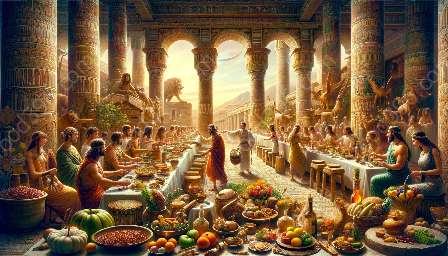Ancient Egyptian cuisine is an intriguing window into the culinary traditions and food culture of one of the world's oldest civilizations. The ancient food cultures of Egypt offer a rich tapestry of flavors, ingredients, and culinary techniques that have left an indelible mark on the history of food. In this exploration, we delve into the depths of ancient Egyptian cuisine and its fascinating connections to food culture and history.
Ancient Egyptian Ingredients and Flavors
Ancient Egyptian cuisine was characterized by a diverse range of ingredients and flavors that were heavily influenced by the fertile Nile River valley and the rich agricultural practices of the ancient Egyptians. Staples of the ancient Egyptian diet included grains such as wheat and barley, which formed the basis of their bread, one of the most important foods in their culture. Other essential ingredients included fruits such as dates, figs, and grapes, as well as vegetables like onions, garlic, and lettuce. The ancient Egyptians also consumed a variety of meats, including beef, poultry, and fish, while honey was used as a sweetener in their cuisine.
Culinary Techniques and Tools
The ancient Egyptians utilized a variety of culinary techniques and tools to prepare their food. Baking and brewing were integral to their food culture, with bread and beer holding special significance in their diet. The use of fermentation in beer production and leavening in bread baking demonstrate their advanced understanding of food preservation and processing. Additionally, the ancient Egyptians employed various cooking methods, including baking, boiling, and grilling, often using clay ovens and open fires for their culinary endeavors.
Food Symbolism and Rituals
Ancient Egyptian cuisine was deeply intertwined with symbolism and rituals, reflecting the religious beliefs and cultural practices of the time. Certain foods held symbolic meaning, with offerings of bread, beer, and other culinary items being made to the gods in religious ceremonies and rituals. The act of eating was also imbued with significance, as communal meals and feasts played a central role in social and religious gatherings, reinforcing the importance of food in ancient Egyptian culture.
Ancient Food Cultures and Exchange
The ancient Egyptian food culture was not isolated, but rather interconnected with the broader ancient food cultures of the Mediterranean and Near East. Trade and exchange of foodstuffs and culinary traditions occurred across ancient civilizations, leading to the integration of ingredients and cooking techniques from neighboring regions. This dynamic exchange influenced the evolution of ancient Egyptian cuisine and contributed to the diversity of flavors and dishes found in their culinary repertoire.
Legacy and Historical Significance
Ancient Egyptian cuisine has left a lasting legacy in the annals of food culture and history, shaping the culinary landscape of the ancient world and beyond. The enduring presence of staples like bread, beer, and honey in global cuisines attests to the profound impact of ancient Egyptian culinary traditions. Furthermore, the archaeological evidence of food remains and culinary artifacts provides valuable insights into the daily lives and dietary habits of ancient Egyptians, enriching our understanding of their food culture and history.

